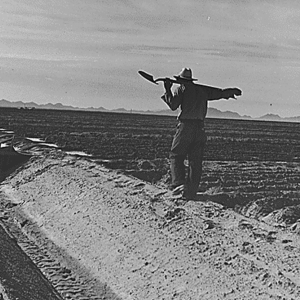
Mitchell Atencio is the senior associate news editor at Sojourners. He first served as a contract reporter for Sojourners in 2020.
Mitchell believes his role as a journalist is to ask compelling questions of the right people and to tell stories that impact the actions of readers. He loves writing stories of the radical or unique — especially within faith. Before joining Sojourners, Mitchell was a reporter in Kirkland, Wash. At Arizona State University he was a passionate and dedicated member of the award-winning, independent, student-newspaper The State Press. He also graduated with a degree in journalism and mass communications, but he doesn’t care as much about that part.
Although he didn’t stay long enough, Mitchell is proud to have been born in Atlanta and dreams of returning.
In journalism and elsewhere, Mitchell advocates for the physical medium. He is a vinyl record collector; a film photographer who shoots, develops, and scans his own film; a magazine subscriber; and a fan of writing letters on the family typewriter. In his spare time, he reads liberation theology, practices Zen, watches a lot of tennis, rants about the evils of pickleball, and makes coffee with a variety of methods. Mitchell is discalced out of religious commitment; he concedes it probably makes him a hippie.
Posts By This Author
Under Investigation for Discrimination, Seattle Pacific University Sues
Seattle Pacific University announced on July 28 that it is suing Washington state Attorney General Bob Ferguson, after the attorney general opened an investigation into whether SPU was violating the state’s anti-discrimination laws. SPU, which is affiliated with the Free Methodist Church, contends that Ferguson’s investigation is a violation of the school’s religious freedom.
Churches and the NFL Share the Same Sin
The question, for all of us, is what do abusers gain by offering vague apologies? What are they trying to achieve? The men and their supporters are attempting to weaponize a Christian culture of unending forgiveness. While forgiveness is indeed a virtue, it should never come at the expense of those harmed. [John] Crist and [Deshaun] Watson (and their colleagues) refuse to properly repent, apologize, or seek to repair the harm they are accused of. Instead, they ask their victims — and us — to move on.
Ron Sider, Who Called Evangelicals To Social Justice, Dies at 82
Ronald J. Sider, founder of Christians for Social Action and a stalwart evangelical advocate for social justice, died of a cardiac arrest on July 27. He was 82 years old.
Why Faith Scholars Joined a Critical Race Theory ‘Summer School’
Last week the African American Policy Forum held its third annual summer school for scholars to discuss and develop anti-racism efforts in the United States. This year, AAPF dedicated a portion of its programming to “Keeping the Faith,” an exploration of Christianity and critical race theory.
Protests, Pride Flags, Lawsuits: Inside a Christian University’s Fight for LGBTQ Inclusion
Over the last year, the majority of Seattle Pacific University’s community has been unwavering in its affirmation of LGBTQ equality on campus ... Nevertheless, on July 1, the evangelical university’s board of trustees affirmed — for a third time in about a year — that the school would not change its employee policy.
Six Down, Six To Go
Welcome to the second half of 2022.
Roe Is Over: Faith Leaders On What That Means for Christians
The Supreme Court overturned 49 years of federal abortion rights on Friday, in its decision on Dobbs v. Jackson Women’s Health Organization. Faith leaders and advocates told Sojourners they were not surprised by the court’s decision, which was nearly identical to the draft leaked in May. However, many leaders echoed Rev. Katey Zeh, CEO of the Religious Coalition for Reproductive Choice, who told Sojourners that “the emotional impact of a moment like this can’t be underestimated.”
Eboo Patel Wants To Build Better Institutions
In his new book, We Need to Build, Patel seeks to inspire others to build with him instead of just criticizing policies and structures they dislike. The book draws on Patel’s work with Interfaith America and considers what we can learn from good (and bad) institutions across the globe.
Exploring the Gospel Through the Lens of Grief
NATALIE BERGMAN DID NOT anticipate a particular response from Christians to her first solo album, Mercy. Released in May 2021, it was a departure from Bergman’s work with her brother in the duo Wild Belle, offering a gentler sound and deep lyrics. Yet Mercy has been hailed as a masterpiece that explores gospel through the lens of grief. Christians, particularly millennials and Gen Zers who long ago grew sick of Air1 and K-LOVE, have celebrated the work.
But Bergman wasn’t thinking about listener reaction before releasing Mercy. She wrote, produced, and mixed the album entirely by herself to process the grief after her father and stepmother were killed by a drunk driver. She said she felt “protected” in its release.
“I knew—after I put the album out—that I was going to have some sort of feedback on [Mercy] from people that are believers ... but I went into this with no fear,” Bergman told Sojourners before her March performance at Songbyrd Music House in Washington, D.C. Citing right-wing trucker protests and other authoritarian manifestations of Christianity, Bergman said she realized later it was a “kind of courageous thing to [release] this body of work, because of the political climate and because of the history that religion has.”
Mercy and the follow-up EP, Keep Those Teardrops from Falling, are fundamentally gospel in every sense of the term.
80 Percent of White Evangelicals Say They Don’t Have LGBTQ Friends
Over 65 percent of Black Protestants, Hispanic Catholics, white Catholics, white mainline Protestants, and white evangelical protestants say their friendship networks are exclusively heterosexual. Eighty percent of white evangelicals said they did not have any LGBTQ people in their friendship network, while 56 percent of religiously unaffiliated people said the same.
Blood Donation Is Crucial to My Faith
In the summer of 2009, when I was 12 years old, a street racer crashed into my grandparents' minivan. The accident, by all means, should have killed my grandad, who was in a coma for several weeks after the crash. While undergoing emergency surgeries, he lost 98 units of blood in six hours — about the blood of 10 people. They were pumping blood into him as fast as it was coming out. Ever since that day, blood donation has held a place close to my heart.
Losing Isn’t Inevitable
This week has been one where loss seems as close as it might ever be — losses significantly more important than tennis matches. Thinking of politics as sports is deeply unhealthy but understanding and identifying when we are losing is important. Loss is never inevitable, but neither is victory.
What Would the End of Roe v. Wade Mean? Christian Leaders Respond
On the evening of May 2, Politico reported on a leaked draft of a Supreme Court decision in Dobbs v. Jackson which, if it became official, would overturn Roe v. Wade and end federal protections of abortion rights.
A May Day Reading List to Inspire Faith and Worker Justice

Eloy District, Pinal County, Arizona. Mexican irrigator on duty preparing field for flax cultivation. Via the U.S. National Archives Flickr.
Through the years, we’ve written about the ways churches can help workers — and the way workers can help the church.
A Short Ode to Twitter
Twitter is a strange thing — if it’s any singular thing at all. If it does come to an end, I hope we’ll look back reflectively and carefully, learning from what we got right, what we got wrong, and growing into the future.
Wipf and Stock To Pull ‘Bad and Boujee’ From Publication, Distribution
Wipf and Stock Publishers confirmed today that it has initiated the removal and ceased distribution of Jennifer M. Buck’s book, Bad and Boujee: Toward a Trap Feminist Theology, after days of criticism directed at the book.
Trading Apologetics for Humility
Proximity and humility are sometimes an answer for our beliefs.
This Spring, Let Truth Bloom
This spring, I’m thinking about the season as a blooming period for the complexities of truth. That’s not to say that truth itself is complicated, but that the application, acknowledgment, or apprehension of truth can be a sticky mess. Truth will set you free, but then we get to wrestle with freedom and the responsibility that comes with it: Realizing that racism is ingrained in the church is important, for instance, but acting to rid the church of that sin is paramount.
Grab Your Helmets, Let’s Do Some Myth Busting

Brad Stine performs. By Hope4ASU via Flickr.
When I was a kid, Christian comic Brad Stine yelled at me about wearing a helmet while riding my bike. He also yelled about seatbelt and car-seat laws, smoking laws, and gay marriage through his stand-up routine that I sat in the front row for.
Back When the World Was Grayscale
If we analyze our current conditions, avoid circular debates, stop waiting for heroes to save us, speak honestly about our past and present, and try to change today, we might just save tomorrow.

















